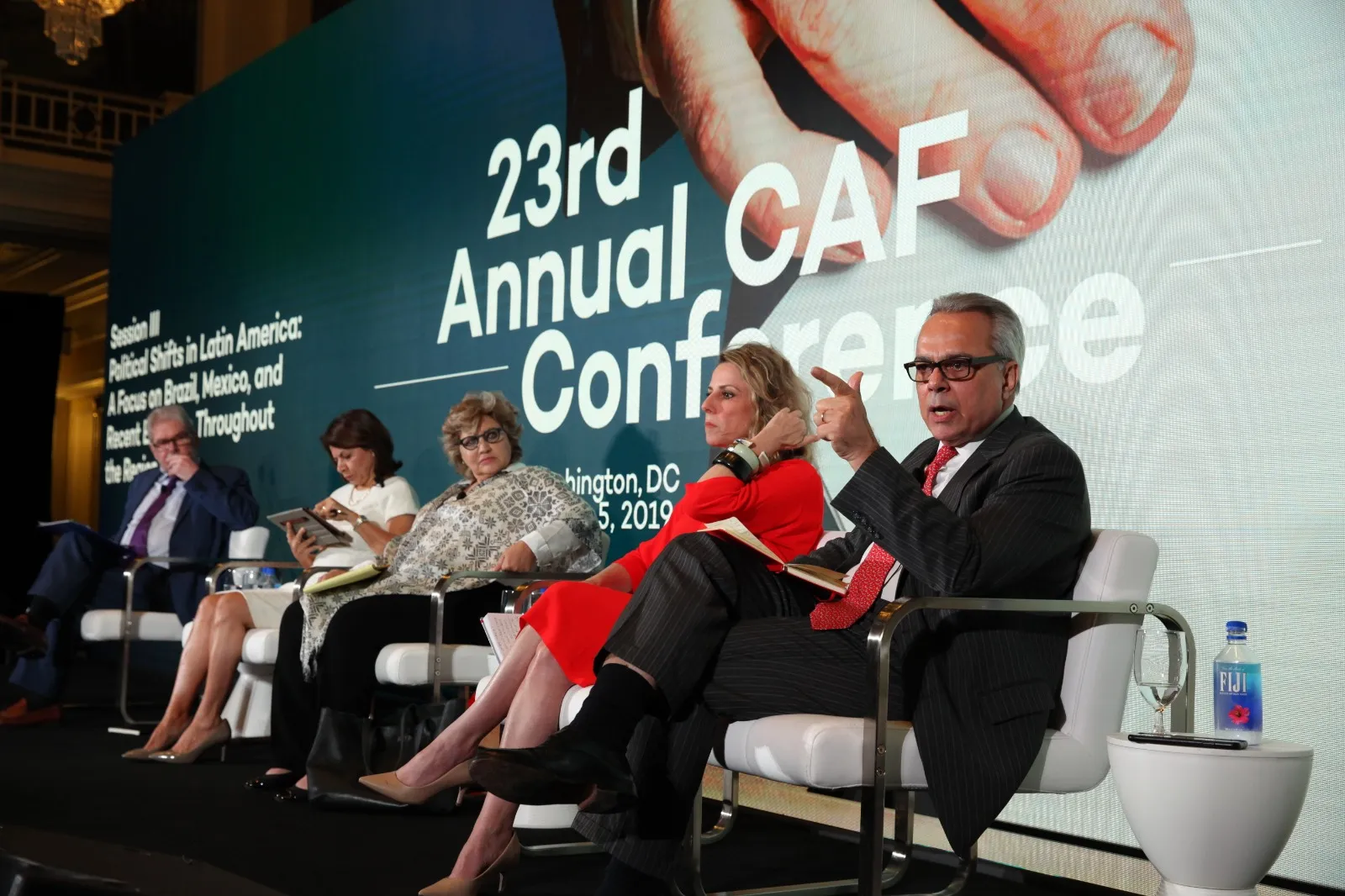The 23rd Annual Conference of the Development Bank of Latin America

The Development Bank of Latin America (CAF) and the Inter-American Dialogue organized the 23rd edition of its Annual Conference on 4 and 5 September 2019. In this event, which was held in Washington D.C, more than 1000 leaders from different sectors met to discuss the main challenges that Latin America faces at the global and regional level. From the Venezuelan crisis to the US-China trade war, and passing through the regional trade agenda and new challenges social networks bring to democracy, the 23rd Conference addressed a wide range of topics, opening a valuable space of discussion for the region.
Este artículo está disponible en Español.
The Director for Latin America and the Caribbean of International IDEA, Dr Daniel Zovatto, participated as a panelist in Session III: Political changes in Latin America: A focus on Brazil, Mexico and the next elections in the region, moderated by the Senior Editor for Latin America of the British weekly The Economist, Michael Reid. The other members of the panel were: former President of Costa Rica, Laura Chinchilla, the founder of Mexico Media Lab, Rossana Fuentes; and the editor of the Época de Brazil Magazine, Daniela Pinheiro.
The Regional Director of International IDEA reflected on the current state of democracy in Latin America and the main trends of the region’s electoral super cycle. According to Zovatto, the current political-electoral context in Latin America is characterized by high uncertainty, volatility, polarization, and populist trends. In addition to the serious crises in Venezuela and Nicaragua (to which there appears to be no democratic or peaceful end in sight), we must focus on the tense situation affecting the Northern Triangle countries. We must also take into account the difficulties facing new presidents Jair Bolsonaro of Brazil, Andrés Manuel López Obrador of Mexico, and Iván Duque of Colombia; the recent crisis in Paraguay that nearly resulted in the impeachment of President Mario Abdo Benítez; President Martín Vizcarra’s risky proposal to move up Peru’s general election by one year; the serious economic and political crisis facing Argentina following the surprising results of the recent presidential primaries (PASO) and the increasingly tense situation between Venezuela and Colombia.
In terms of the economy, considering the great diversity among Latin American countries, regional growth will remain mediocre: 0.6 per cent according to the IMF’s latest projection. As a consequence of this anemic economic growth, poverty will stay slightly above 30 per cent (regional average), the reduction of inequality will remain stagnant, and the labor market will continue to be unable to generate the quality jobs the region needs.
Political culture indicators also herald bad news. All regional polls highlight the sentiment of democratic fatigue throughout Latin America, precisely 40 years after the beginning of the Third Wave of democracy (1978-1979). The data from the 2018 Latinobarometro survey shed light on the midlife crisis Latin American democracy is experiencing: support for democracy fell to 48 per cent (the lowest since 2001), indifference between democracy and authoritarianism rose from 16 per cent to 28 per cent, and dissatisfaction with democracy climbed from 51 per cent to 71 per cent, while satisfaction dropped from 44 per cent to 24 per cent.
Predictably, this sentiment of discontent and frustration negatively impacts trust toward political institutions, especially legislatures and parties. Both institutions have the lowest levels of citizen legitimacy in the region – 21 per cent and 13 per cent, respectively – according to the 2018 Latinobarometro survey. These figures confirm that voters are increasingly distancing themselves from parties (58 per cent of Latin Americans say they have no party), and that there is widespread civil unrest and anger toward politics and ruling elites.
Also, to be expected, this toxic combination of factors has negative repercussions for the quality of democracy and the integrity of elections. According to the 2018 Democracy Index published by the prestigious British weeklyThe Economist, only Uruguay, and Costa Rica qualify as full democracies. Ten countries are considered flawed democracies (Argentina, Brazil, Chile, Colombia, the Dominican Republic, Ecuador, Mexico, Panama, Paraguay and Peru) and four countries are classified as hybrid regimes (Bolivia, El Salvador, Guatemala and Honduras). Finally, Cuba, Nicaragua and Venezuela qualify as authoritarian regimes (see the full presentation here).
The participation of International IDEA in the event responds to the need to maintain a close collaboration with institutions such as the CAF and the Inter-American Dialogue to promote the development of knowledge and joint projects for the promotion of democracy in the region. The CAF Annual Conferences foster dialogue between different actors of vital importance for the institutional strengthening of the region.



